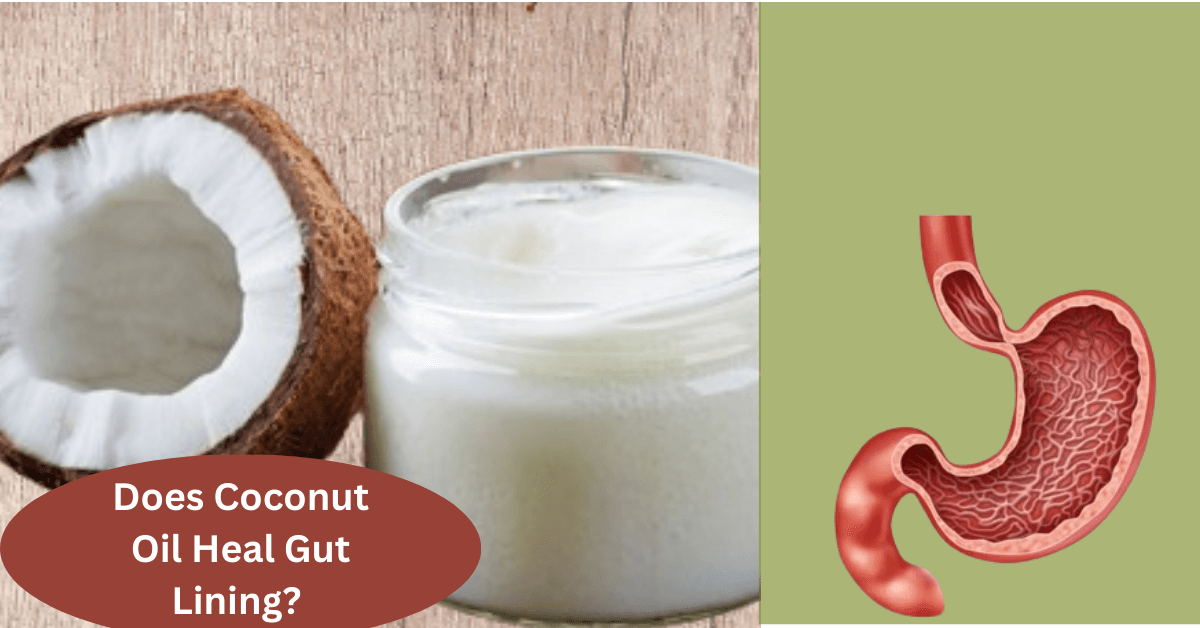Does Coconut Oil Heal Gut Lining? Unveiling the Truth About Its Digestive Benefits
Coconut oil has become a staple in many kitchens and wellness routines over the past decade, praised for its versatility and numerous health benefits. From cooking to skincare, it’s a product that seems to have endless uses. But one of the most intriguing claims is that coconut oil can heal the gut lining and support digestive health. So, does coconut oil truly heal gut lining, or is it just another wellness trend with unsubstantiated claims? In this article, we’ll explore the potential benefits of coconut oil for gut health, examine the science behind it, and help you understand whether it’s an effective remedy for healing your gut lining.

The Gut Lining and Its Importance
Before diving into how coconut oil may help with gut health, it’s important to understand the role of the gut lining in digestion. The gut lining is a protective barrier that lines the digestive tract, playing a crucial role in nutrient absorption and preventing harmful substances from entering the bloodstream. It is made up of a single layer of epithelial cells, which are tightly joined together by tight junctions.
When this gut lining becomes damaged or weakened, it can lead to a condition known as “leaky gut” or intestinal permeability. This condition allows toxins, undigested food particles, and harmful bacteria to leak into the bloodstream, potentially causing widespread inflammation, digestive issues, and autoimmune responses.
Maintaining a healthy gut lining is crucial for overall well-being, as it helps ensure that only properly digested nutrients enter the body and harmful substances are kept at bay. So, can coconut oil contribute to healing this vital barrier?
What Makes Coconut Oil Special for Gut Health?
Coconut oil is primarily composed of medium-chain triglycerides (MCTs), a type of fat that is metabolized differently than long-chain fatty acids found in most other oils. MCTs are easily absorbed by the body and are quickly converted into energy. But the benefits of coconut oil go beyond its energy-boosting properties. Research suggests that coconut oil may offer several properties that could help heal and protect the gut lining, including its anti-inflammatory, antimicrobial, and antioxidant effects.
Here are some ways in which coconut oil might support the healing of the gut lining:
- Anti-Inflammatory Properties Chronic inflammation is a leading cause of gut lining damage. Conditions like irritable bowel syndrome (IBS), leaky gut, and inflammatory bowel diseases (IBD) such as Crohn’s disease and ulcerative colitis are characterized by inflammation in the digestive tract. The anti-inflammatory properties of coconut oil can help reduce this inflammation, potentially allowing the gut lining to heal.Coconut oil contains lauric acid, which has been shown to have anti-inflammatory effects. Lauric acid can help reduce gut inflammation by modulating the immune response and lowering the production of pro-inflammatory cytokines. By reducing inflammation, coconut oil may promote healing of the damaged gut lining, helping restore its protective barrier.
- Antimicrobial Effects A balanced gut microbiome is essential for maintaining the integrity of the gut lining. Disruptions in the microbiome can contribute to gut issues, including leaky gut. Coconut oil has strong antimicrobial properties, which means it can help balance the gut microbiome by eliminating harmful bacteria, yeast, and fungi.The lauric acid in coconut oil has been shown to have antibacterial, antiviral, and antifungal effects. It can fight off harmful microorganisms that might otherwise contribute to gut lining damage. By reducing the harmful microbial load in the digestive tract, coconut oil may help create a more favorable environment for gut healing and protection.
- Gut Healing and Nutrient Absorption Coconut oil is also a source of healthy fats that may support the absorption of fat-soluble vitamins like A, D, E, and K. These vitamins play important roles in immune function, inflammation regulation, and tissue repair, all of which are crucial for healing the gut lining. Consuming coconut oil can help ensure that the body is absorbing these essential nutrients, potentially aiding in the repair of the gut lining.
- Promoting Healthy Mucosal Barrier The mucosal barrier in the gut plays a vital role in protecting the gut lining from harmful substances and pathogens. Some studies suggest that coconut oil may help promote the health of this mucosal barrier, making it more resistant to damage. This could help prevent leaky gut and support the healing of the gut lining.
- Improving Digestion and Gut Motility Coconut oil may also improve digestion by promoting better gut motility. Healthy fat intake is known to support the digestive process by helping the body break down and absorb nutrients more efficiently. Coconut oil can act as a natural lubricant for the digestive tract, potentially improving the movement of food and waste through the intestines. By supporting overall digestive health, coconut oil may indirectly contribute to the healing of the gut lining.
Can Coconut Oil Really Heal Gut Lining?
While there are many promising benefits of coconut oil for gut health, the idea that it can directly “heal” the gut lining is more nuanced. Research into the specific effects of coconut oil on gut lining health is still ongoing, and while some studies suggest that coconut oil may have beneficial effects, there is not yet enough clinical evidence to definitively claim that coconut oil can heal a damaged gut lining on its own.
However, it is clear that coconut oil can support gut health in several ways. Its anti-inflammatory, antimicrobial, and nutrient-absorbing properties can certainly help improve the overall health of the digestive system. By promoting a healthier gut environment, coconut oil may aid in the recovery of a compromised gut lining, but it should be part of a comprehensive approach that includes a balanced diet, a healthy lifestyle, and the management of any underlying health conditions.
How to Use Coconut Oil for Gut Health
If you’re considering using coconut oil to support gut health, it’s important to do so in moderation and as part of a well-rounded diet. Here are a few tips for incorporating coconut oil into your routine:
- Start Slowly While coconut oil is generally considered safe for most people, it’s a good idea to start with small amounts to see how your body reacts. Begin with a teaspoon of coconut oil per day and gradually increase the amount if you tolerate it well. Too much coconut oil at once can lead to digestive discomfort, so it’s important to find the right balance.
- Add Coconut Oil to Your Diet Coconut oil can be used in a variety of ways. You can add it to smoothies, use it as a cooking oil, or simply take a spoonful on its own. Make sure to choose organic, virgin coconut oil for the best quality and benefits.
- Pair with Other Gut-Healthy Foods To maximize the healing potential of coconut oil, combine it with other gut-friendly foods. Fiber-rich vegetables, fermented foods like sauerkraut and kimchi, and bone broth can all contribute to gut health and support the healing process.
- Consider Supplementation If you find it difficult to incorporate enough coconut oil into your diet, you might consider taking coconut oil supplements. However, be sure to consult with a healthcare professional before starting any new supplement regimen.
Potential Side Effects of Coconut Oil
While coconut oil has many potential benefits, it’s important to be aware of potential side effects, especially if consumed in large amounts. Some people may experience digestive discomfort, such as bloating, diarrhea, or nausea, particularly when they first introduce coconut oil into their diet. Coconut oil is also high in saturated fat, so it should be consumed in moderation, especially if you are concerned about heart health or managing cholesterol levels.
Conclusion: Does Coconut Oil Heal Gut Lining?
Coconut oil offers numerous benefits for gut health, including its anti-inflammatory, antimicrobial, and digestion-supporting properties. While there is no definitive evidence that coconut oil can directly heal a damaged gut lining, it can certainly support gut health and create an environment conducive to healing. By reducing inflammation, promoting a healthy gut microbiome, and supporting nutrient absorption, coconut oil can be a valuable addition to your digestive health routine.
However, coconut oil should not be seen as a cure-all for gut issues. To truly heal the gut lining and support overall digestive health, it’s important to take a holistic approach that includes a balanced diet, stress management, and appropriate medical treatment if necessary. If you’re considering using coconut oil to support your gut health, it’s always a good idea to consult with a healthcare professional to determine the best approach for your individual needs.

